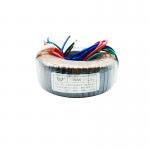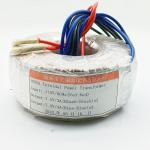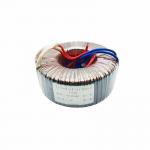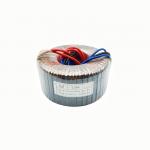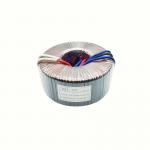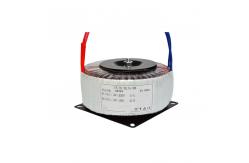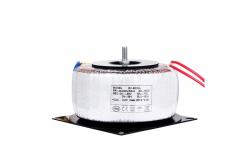Compact High Efficiency 120W Toroidal Transformer for Audio Power
Amplifier
1.Product Description
The 120W toroidal transformer stands out among various electronic
devices due to its compact structure and high efficiency
performance. It adopts a ring-shaped magnetic core with a closed
magnetic circuit, greatly reducing magnetic leakage, not only
reducing electromagnetic interference, but also achieving higher
magnetic efficiency. The winding is tightly wound and combined with
high-quality magnetic materials, endowing it with excellent power
processing capability, and can stably output 120W power. Efficient
energy conversion efficiency can typically reach 86% -95%,
effectively reducing energy loss. Moreover, it operates quietly
with minimal mechanical vibration, providing stable power support
for noise sensitive equipment. These characteristics make the 120W
toroidal transformer an ideal power conversion component for
ensuring stable operation and high-quality performance in fields
such as audio equipment, industrial control, communication, and
smart homes.
2.Advantages of 120W toroidal transformer in application
| Advantages | Explanation in Application |
| High Efficiency | - Generally, 120W toroidal transformers can achieve an efficiency
of 86% - 95%. High - quality core and winding materials, along with
optimized design, reduce magnetic and copper losses. This means
more of the input power is effectively transferred to the output,
minimizing energy waste and operating costs in applications such as
audio equipment, industrial control, and communication devices. |
| Compact Size | - Their toroidal shape results in a more compact and space - saving
design compared to other types of transformers. In applications
where space is limited, like small - scale communication base
stations and compact audio devices, this allows for easier
integration into the overall system layout without sacrificing
power capacity. |
| Low Electromagnetic Interference (EMI) | - The toroidal structure confines the magnetic field more
effectively within the core, reducing magnetic flux leakage. In
sensitive electronic applications such as medical monitoring
equipment and audio systems, this minimizes interference with other
components, ensuring stable and accurate operation and high -
quality signal processing. |
| Good Voltage Regulation | - They can maintain a relatively stable output voltage under
different load conditions. In industrial control systems and smart
home appliances, this ensures that the connected devices receive a
consistent power supply, preventing performance degradation or
damage due to voltage fluctuations. |
| High Power Density | - With a power rating of 120W, toroidal transformers can deliver a
significant amount of power in a relatively small size. This is
beneficial in applications where high - power output is required in
a limited space, such as in some high - end audio power amplifiers
and industrial testing instruments. |
3.Function
1. Voltage conversion: This is one of its core functions. By
changing the turns ratio of the primary and secondary windings, the
input voltage can be converted into a specific output voltage
required by the device. For example, in some electronic devices
that require the conversion of mains power (commonly 220V or 110V)
to lower DC voltage, a 120W toroidal transformer can first step
down the mains power, and then cooperate with rectification and
filtering circuits to provide suitable DC operating voltage for the
equipment. Whether it is supplying power to electronic device
motherboards or providing different levels of voltage for specific
functional modules, it can achieve flexible voltage transformation
through precise turn ratio design.
2. Power transmission: It can carry 120W of power, which means it
can provide corresponding electrical energy to the load. In an
audio power amplifier, a toroidal transformer transfers sufficient
power to the amplification circuit, giving the amplifier enough
driving force to drive the speaker to produce sound, ensuring full
sound quality and sufficient volume. In industrial equipment, it
can also provide stable power for loads such as motors to ensure
the normal operation of the equipment.
3. Electrical isolation: Energy is transmitted between the primary
winding and the secondary winding through magnetic field coupling,
without direct electrical connection, thus achieving electrical
isolation between the input and output circuits. This isolation
function is crucial in ensuring personal safety and stable
operation of equipment. For example, in medical equipment, it can
prevent patients from experiencing electric shock due to electrical
faults when in contact with the equipment; In communication
devices, electrical interference between different circuits can be
avoided, improving the stability and accuracy of signal
transmission.
4. Filtering and voltage regulation: Although the 120W toroidal
transformer itself is not a specialized filtering and voltage
regulation component, it can effectively improve power quality when
combined with other circuit components such as capacitors,
inductors, etc. After the rectification circuit, when the pulsating
DC power output by the transformer is filtered by capacitors, the
inductance characteristics of the toroidal transformer can help
smooth the current and reduce voltage fluctuations. At the same
time, to a certain extent, it can suppress high-frequency noise in
the power supply through its own electromagnetic characteristics,
providing a relatively stable and pure power supply for the load,
especially suitable for precision electronic devices that require
high power supply stability.
5. Impedance matching: In some circuit systems, the source
impedance and load impedance need to be matched to achieve maximum
power transmission. The 120W toroidal transformer can change the
output impedance by adjusting the winding turns ratio, allowing the
load to achieve optimal power transmission. For example, in an
audio system, the output impedance of a power amplifier can be
matched with the input impedance of a speaker to improve the
transmission efficiency of audio signals, avoid signal reflection
and power loss, and thus enhance sound quality.
